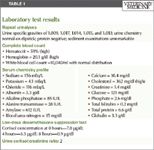Just Ask the Expert: Why does this bearded collie have PU/PD?
Dr. David Bruyette helps a reader with a difficult endocrinology case.
Dr. Bruyette welcomes endocrinology questions from veterinarians and veterinary technicians.
Click here to submit your question, or send an e-mail to vm@advanstar.com with the subject line "Endocrinology questions."
One of my patients, a 6-year-old spayed female bearded collie, has polyuria and polydipsia (PU/PD) but is apparently otherwise healthy—normal appetite, activity, and mentation. Physical examination findings are normal, and the dog's spay was done elsewhere. The results of laboratory tests are listed in Table 1.

David S. Bruyette, DVM, DACVIM
I am confused by the dexamethasone suppression test results as I have never seen incomplete suppression at four hours and total suppression at eight hours. I suspect this dog does not have hyperadrenocorticism because of the normal urine cortisol:creatinine ratio.
Normally, my next step would be a water deprivation test, but I am concerned about the suppression test results. I do not know how to proceed. Is a stump pyometra possible? I have seen a case of polycythemia vera, but that dog had syncopal episodes and a hematocrit over 65%. Any suggestions you have would be greatly appreciated.

Table 1: Laboratory test results
A. When we look at low-dose dexamethasone suppression test results, the first value to look at is the eight-hour post sample. If this sample shows adequate suppression (as it does in your case), then the result is normal. That does not mean the dog does not have Cushing's disease since up to 10% of dogs with Cushing's disease still show adequate suppression either because they are early in the disease process or they have atypical Cushing's disease due to a sex steroid abnormality.
The normal urine cortisol:creatinine ratio together with the normal low-dose dexamethasone suppression test result make hyperadrenocorticism unlikely in this dog.
If the dog has other signs of Cushing's disease (e.g. skin or hair coat changes), then you could consider an ACTH stimulation test to look at adrenal sex steroids. If the dog has some form of diabetes insipidus (central or nephrogenic), we would expect to see hyposthenuria (urine specific gravity < 1.008). Given the urine specific gravities in this case, we could be looking at some form of partial diabetes insipidus.
The hematocrit is elevated and could result in partial diabetes insipidus through interference with antidiuretic hormone release from the pituitary or altered binding of antidiuretic hormone to receptors in the kidney.
I would start to look for why the dog has a hematocrit of 59%. If this is repeatable, then I would determine if the increase is absolute (true increase in red blood cell mass) or relative (secondary to dehydration). In this case, no other laboratory findings support dehydration, so that seems unlikely.
With an absolute increase in red blood cell mass, we then determine if the increase is appropriate (secondary to hypoxemia and subsequent increase in erythropoietin) or inappropriate (normal oxygenation and inappropriate release of erythropoietin) as can be seen with polycythemia vera and renal neoplasia.
With documented persistent or increasing red blood cell mass, I would start with an arterial blood gas analysis and pulse oximetry to rule out hypoxemia. If hypoxemia is present, the next step would be thoracic radiography and echocardiography to look for pulmonary disease or a right to left intra- or extra-cardiac shunt. If those test results are normal, consider abdominal ultrasonography to rule out renal neoplasia before pursuing additional testing for polycythemia vera.
David S. Bruyette, DVM, DACVIM
VCA West Los Angeles Animal Hospital
1818 S. Sepulveda Blvd.
West Los Angeles, CA 90025
Veterinary Diagnostic Investigation and Consultation
26205 Fairside Road
Malibu, CA 90256
Sweet pee new remedy in feline diabetes
November 9th 2023A novel class of drugs normalizes blood glucose in type 2 diabetic cats by dumping sugar into urine rather than modulating glucose uptake in the tissues but patient selection and close monitoring are crucial to using them safely
Read More